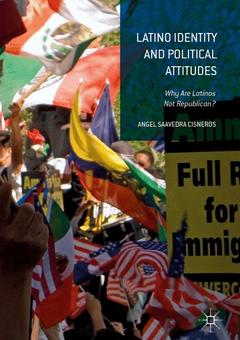Description
Latino Identity and Political Attitudes, Softcover reprint of the original 1st ed. 2017
Why Are Latinos Not Republican?
Author: Saavedra Cisneros Angel
Language: English
Subjects for Latino Identity and Political Attitudes:
Approximative price 116.04 €
In Print (Delivery period: 15 days).
Add to cartPublication date: 11-2016
Support: Print on demand
Approximative price 116.04 €
In Print (Delivery period: 15 days).
Add to cartPublication date: 07-2018
Support: Print on demand
Description
/li>Contents
/li>Biography
/li>Comment
/li>
This book explores the forces that shape Latino political preferences, arguing that social identities are at the center of Latino partisanship. Despite hopes of the Republican Party for bringing in Latinos through religious and moral issues, Latinos in America consistently side with the Democratic Party. Two possible explanations based on social identity emerge as theories of Latino partisanship. The first possibility is that Latinos behave as a single-issue public driven politically by the issue of immigration. A thorough exploration of this possibility in part two of the book finds very little evidence to justify treating Latinos as a single-issue public. The second explanation, presented in part three, relies more heavily on the concept of social identities. Latino pan-ethnic identity emerges as one of multiple identities available to Latinos in America. These multiple, diverse, and overlapping identities are the force behind Latino partisanship. Latino ethnic identity trumps the impact of religious identities in making Latinos more Democratic.
Angel Saavedra Cisneros is Assistant Professor of Political Science at the University of Texas Rio Grande Valley, USA. His research focuses on the psychological forces that drive political behavior among Latinos and other minorities. He also focuses on campaigns and elections in both the United States and Mexico.
Demonstrates that Latino partisanship is less of a rational calculation of issue preference and more of a psychological process related to group identity
Dispels the notion that Latinos are a "single issue public" whose primary concern is immigration
Shows that Latinos espouse multiple identities rather than choosing one social or national identity over another
Develops a measure of Latino pan-ethnic identity as the building block for political attitudes and behavior




